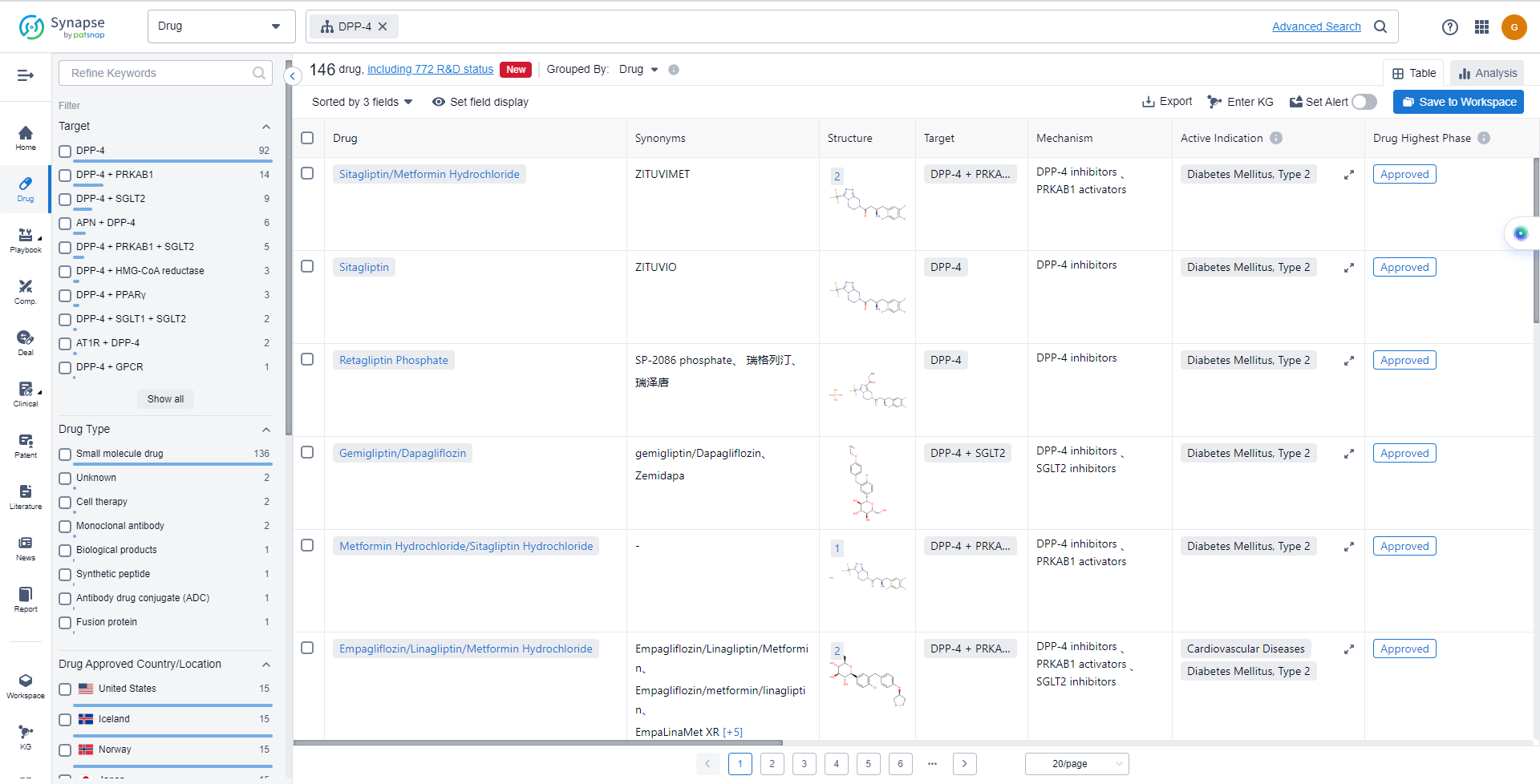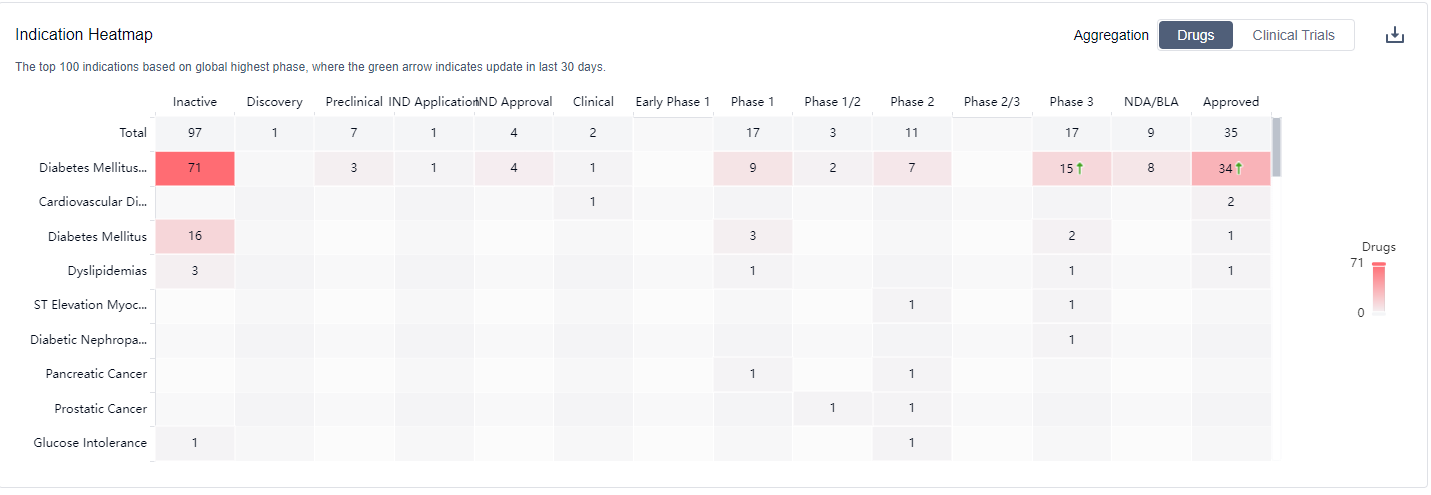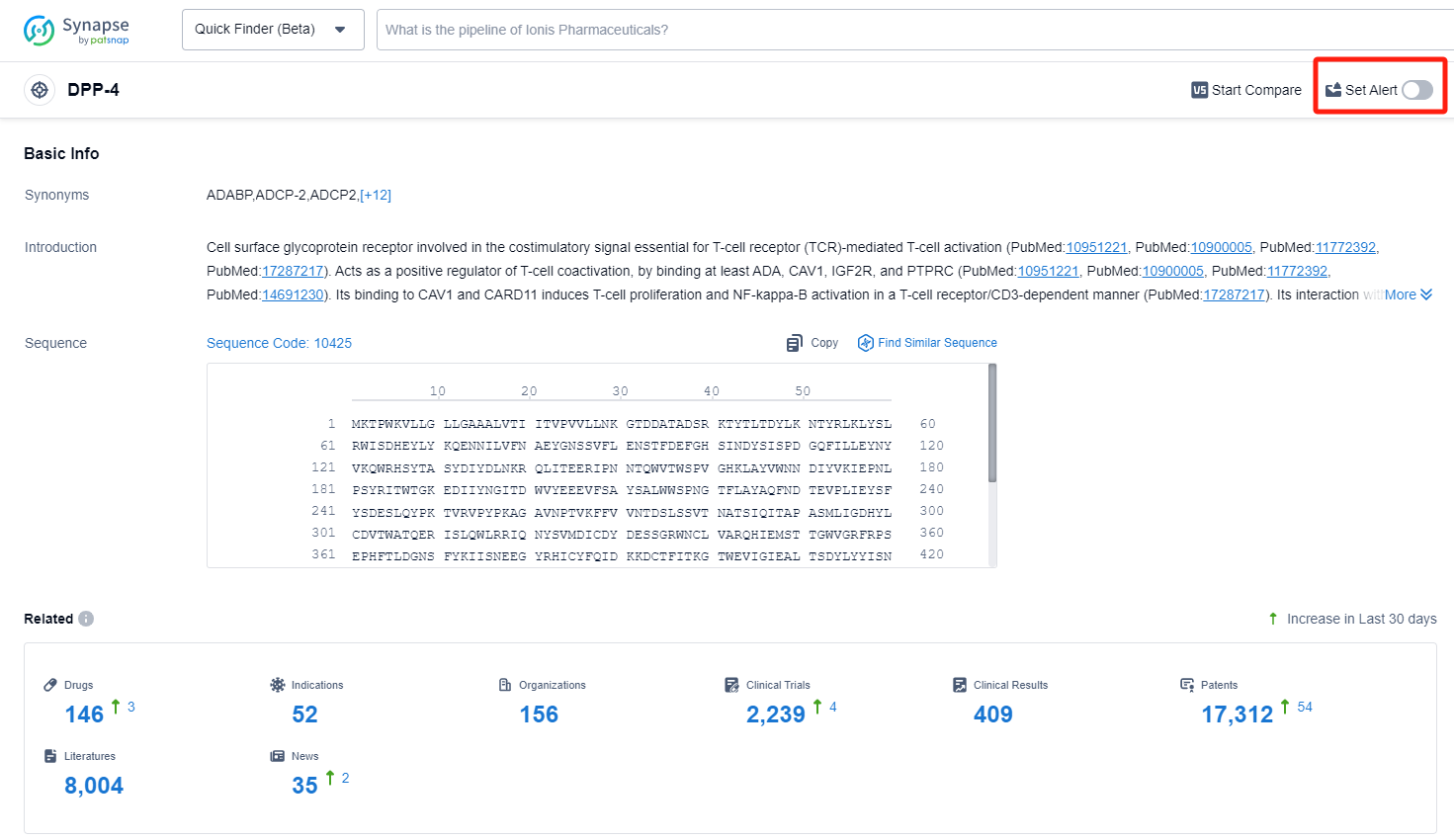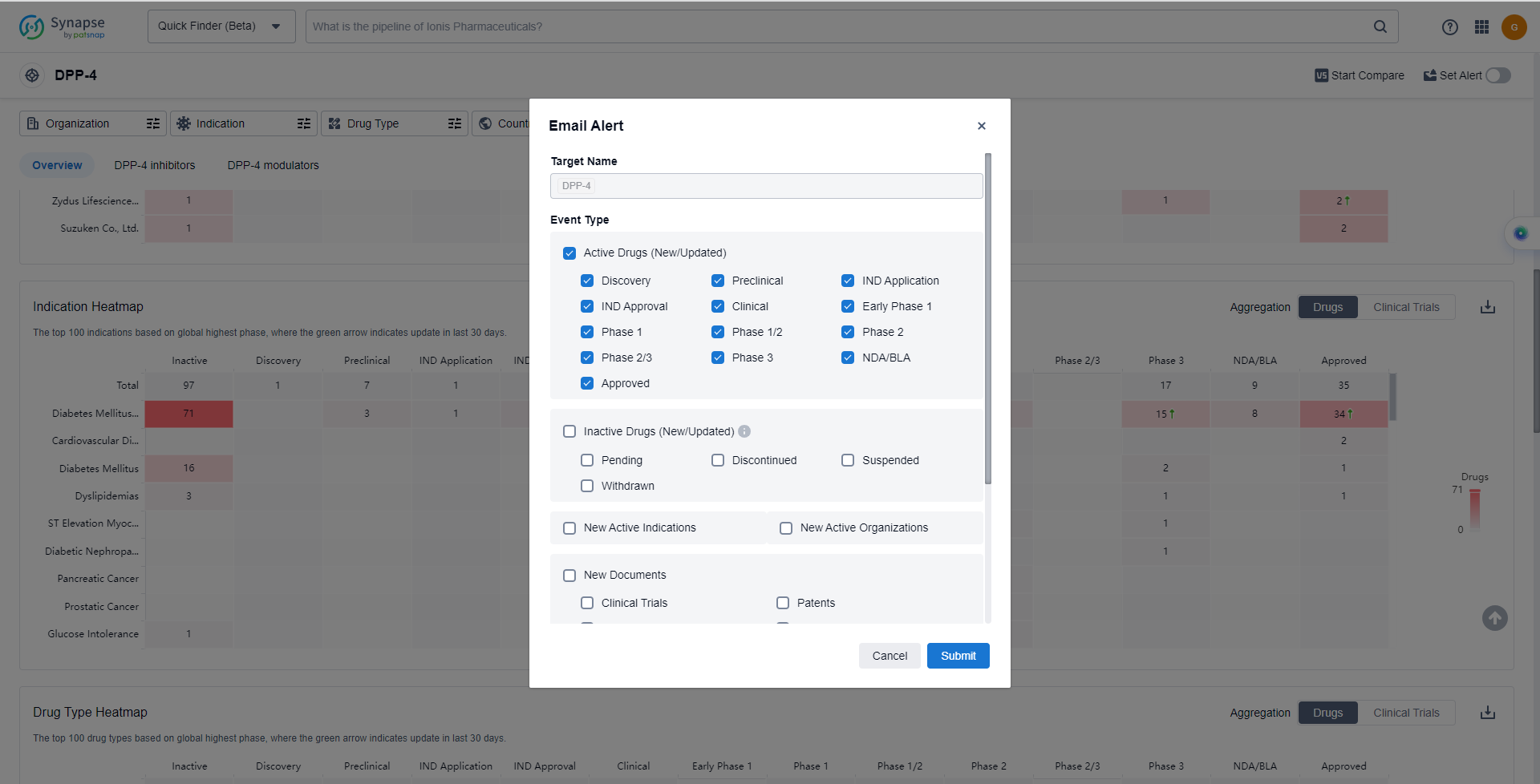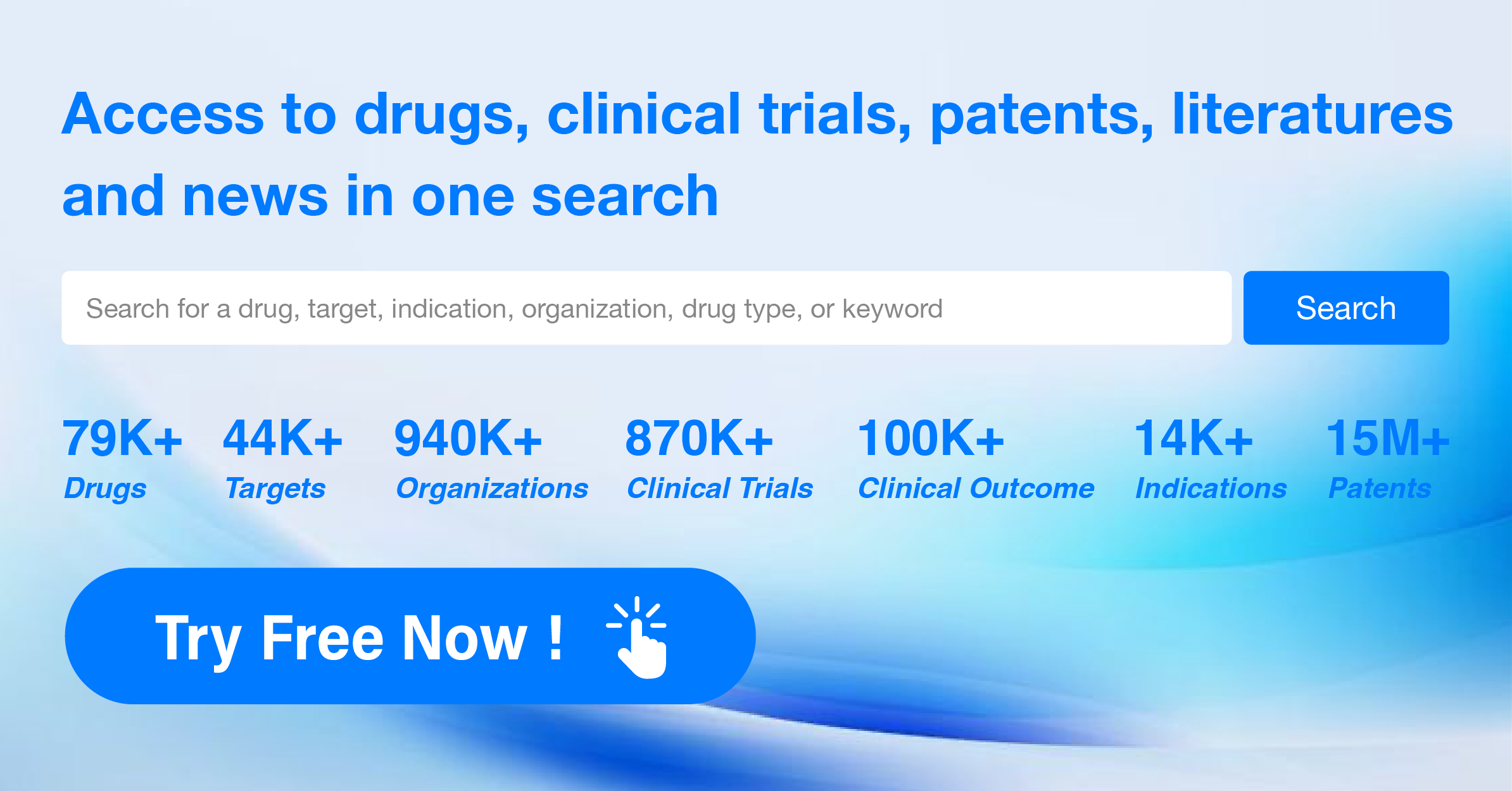What are DPP-4 inhibitors and how do you quickly get the latest development progress?
Dipeptidyl peptidase-4 (DPP-4) is an enzyme found in the human body that plays a crucial role in regulating glucose metabolism. It is primarily expressed in the pancreas, intestines, and immune cells. DPP-4 is responsible for breaking down incretin hormones, such as glucagon-like peptide-1 (GLP-1) and glucose-dependent insulinotropic polypeptide (GIP), which are released after a meal to stimulate insulin secretion and reduce blood sugar levels. By inhibiting DPP-4 activity, pharmaceutical drugs can prolong the action of these incretin hormones, leading to increased insulin release, improved glycemic control, and potential therapeutic benefits for individuals with type 2 diabetes.
Several dozens of DPP-4 inhibitors have been introduced to the market, with sitagliptin, vildagliptin, saxagliptin, alogliptin, and linagliptin being available in domestic markets. DPP-4 inhibitors can be combined with multiple antidiabetic drugs to form fixed-dose combinations, among which, the combinations with metformin are most common. The currently available DPP-4 inhibitor-metformin fixed-dose combinations in the domestic market include sitagliptin/metformin tablets, vildagliptin/metformin tablets, saxagliptin/metformin extended-release tablets, linagliptin/metformin tablets. DPP-4 inhibitors can be used as monotherapy for type 2 diabetes and can also be combined with other antidiabetic drugs for the treatment of type 2 diabetes. The most commonly combined antidiabetic drugs with DPP-4 inhibitors are metformin, followed by sulfonylureas, thiazolidinediones, and insulin. They can also be used in combination with two other antidiabetic drugs, forming a triple therapy commonly including combinations of DPP-4 inhibitors + metformin + sulfonylureas, DPP-4 inhibitors + metformin + thiazolidinediones, and DPP-4 inhibitors + metformin + insulin.
The analysis of the target DPP-4 in the pharmaceutical industry reveals a competitive landscape with several companies focusing on the development of DPP-4 inhibitors. Merck & Co., Inc., Takeda Pharmaceutical Co., Ltd., C.H. Boehringer Sohn AG & Co. KG, LG Chem Ltd., and AstraZeneca PLC are among the companies growing fastest under this target. The primary indication for the approved drugs is diabetes mellitus, type 2. Small molecule drugs are progressing most rapidly, indicating intense competition around the innovative drug. The United States, European Union, Japan, and China are the countries/locations developing fastest under this target, with China showing significant progress. Overall, the target DPP-4 presents opportunities for further research and development in the treatment of diabetes and related indications.
Unlocking Blood Sugar Control: The Role of DPP-4 Inhibitors in Type 2 Diabetes Management
DPP-4 inhibitors, also known as dipeptidyl peptidase-4 inhibitors, are a type of medication used in the treatment of type 2 diabetes.
From a biomedical perspective, DPP-4 inhibitors work by inhibiting the enzyme dipeptidyl peptidase-4 (DPP-4), which is responsible for breaking down incretin hormones in the body. Incretin hormones play a role in regulating blood sugar levels by stimulating the release of insulin and reducing the production of glucagon. By inhibiting DPP-4, these medications increase the levels of incretin hormones, leading to improved blood sugar control.
DPP-4 inhibitors are typically taken orally and are often prescribed as an adjunct to diet and exercise in the management of type 2 diabetes. They can be used as monotherapy or in combination with other antidiabetic medications, such as metformin.
Some common examples of DPP-4 inhibitors include sitagliptin, saxagliptin, linagliptin, and alogliptin. These medications have been shown to be effective in lowering blood sugar levels and have a favorable safety profile.
It's important to note that DPP-4 inhibitors are not recommended for the treatment of type 1 diabetes or diabetic ketoacidosis. They are primarily used in the management of type 2 diabetes and can help improve glycemic control in individuals with this condition. As with any medication, DPP-4 inhibitors may have potential side effects, and it is essential to consult with a healthcare professional for proper evaluation and monitoring while taking these medications.
Catalog of DPP-4 Inhibitors
The currently marketed DPP-4 inhibitors include:
- Sitagliptin/Metformin Hydrochloride
- Sitagliptin
- Retagliptin Phosphate
- Gemigliptin/Dapagliflozin
- Metformin Hydrochloride/Sitagliptin Hydrochloride
- Empagliflozin/Linagliptin/Metformin Hydrochloride
- Anagliptin/Metformin Hydrochloride
- Ertugliflozin/Sitagliptin Phosphate
- Gosogliptin
- Evogliptin
For more information, please click on the image below.
What is the purpose of using DPP-4 inhibitors?
DPP-4 inhibitors can be used as a mono-drug treatment for type 2 diabetes, or in combination with other glucose-lowering drugs for the treatment of type 2 diabetes. For more information, please click on the image below to log in and search.
How can you get the most recent advancements in DPP-4 inhibitors?
In the Synapse database, you can keep abreast of the latest research and development advances of DPP-4 inhibitors anywhere and anytime, daily or weekly, through the "Set Alert" function. Click on the image below to embark on a brand new journey of drug discovery!
